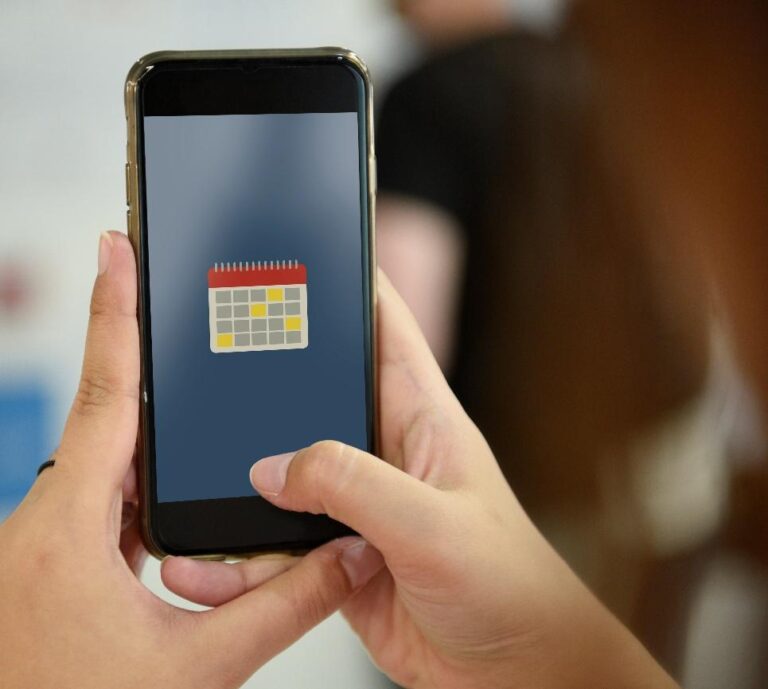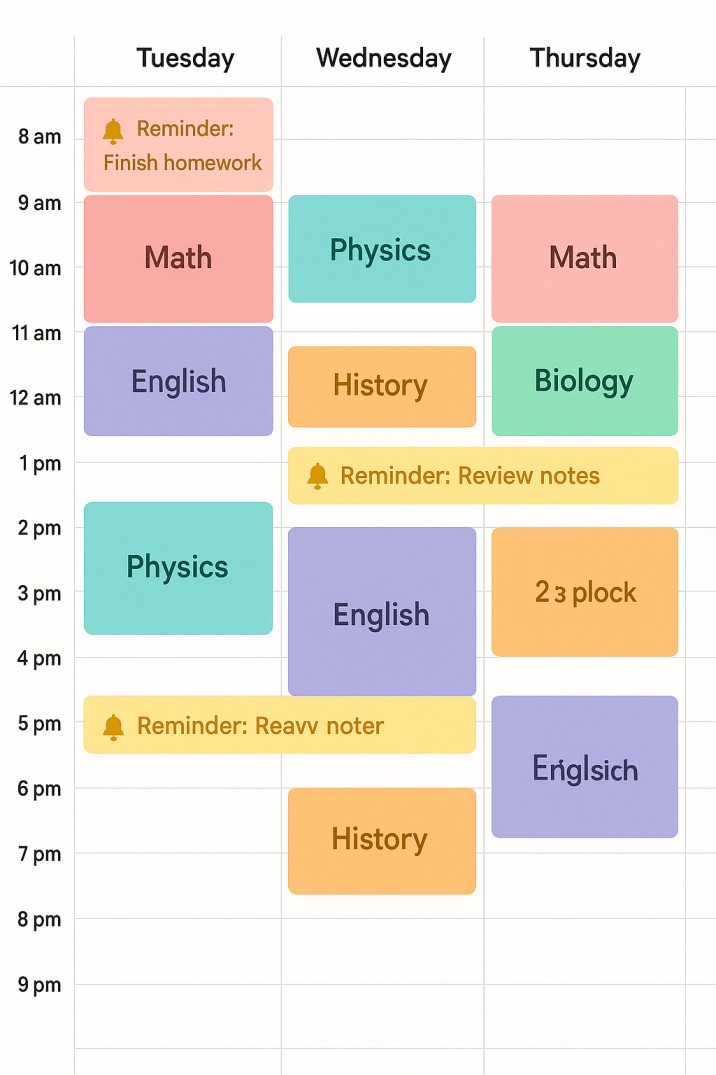
3 Golden Rules for Balancing Academics with Technology
Managing classes, assignments, exams, and personal commitments can be overwhelming in today’s fast-paced academic realm. It takes only one missed deadline to send everything spiralling. That’s why selecting the proper study scheduling apps for student is a real way to help.
With some smart planning and some nifty digital calendar hacks, you can plan your time, prioritize, and avoid panicked last-minute tasks. A good study scheduling app student tool does not simply remind you about tasks – it helps to create a realistic plan conducive to your lifestyle. The following sections contain helpful advice, best digital calendar hacks, as well as the best tools to help you accomplish your tasks, and still take care of yourself.
Why Smart Scheduling is Important for Students
Good time management may just be the difference between feeling in charge and feeling overwhelmed. With no plan it’s all too easy to procrastinate or put too much focus on one task and let others slide! A study scheduling app student setup will enable you to:
- Prioritize tasks so that important tasks get done
- Take large projects which feel overwhelming and break them into manageable steps
- Schedule work, but also keep time open for personal time and avoid burnout
- Be more consistent with study habits.
When you can see what needs done and when it is easier to focus and improve your flow.

Choosing the Right Study Scheduling App
Not every app is going to suit every student’s needs. The best study scheduling app for you is going to depend on how you prefer to organize your time and which features resonate with you the most. An ideal study scheduling app option for students should include:
- An uncomplicated, easy-to-use interface: If you’ve designed your schedule using the app but it feels too complicated and/or out-of-control to actually use, be honest with yourself. You’re probably not going to use the app.
- Custom reminders: You want to have reminders set up in the app that send you alerts of your classes, assignments or reminders to take a break.
- Device sync: You should be able to view your study schedule from your phone, tablet and/or laptop.
- Calendar integration: You will want a study planner app that can integrate with calendars, such as Google Calendar, Outlook or other calendars students use.
- Progress tracking: Look for an app that allows you to track your progress over a few days, weeks, months or where you are in the semester.
Some Popular Apps for Study Scheduling for Students
If you’re serious about improving your time management, consider some of these applications:
- Google Calendar – Simple, reliable, and easy to use, Google Calendar can help you enhance your use with digital calendar hacks, such as time blocking. You can quickly set up recurring reminders.
- MyStudyLife – Built for students, this app allows you to keep track of your classes as well as your assignments and exams all in one spot.
- Notion – So many features! This app is flexible enough to include scheduling, note-taking, and project planning all in one workspace.
- Todoist – Very clean and powerful, this task manager allows you to break down assignments into small actions.
- Trello – Trello is great for visual learners who wish to stack their tasks up on boards and cards.
Every app has its own advantages and disadvantages, so use a few to see if there is one that fits your style
Digital Calendar Hacks for Smarter Planning
A digital calendar can be much more than a date tracker; it can be invaluable. Here are some digital calendar hacks to help your calendar work harder for you:
- Colour-code your subjects and activities so you can recognize them immediately.
- Time blocks your day, so there is a place for every task.
- Add a buffer between activities and events to avoid rushing tasks.
- Use recurring events for weekly group or study sessions.
- Add attachments (links or notes) on event calendar entries so your resources are quick and easy to find.

Balancing a schedule
One common mistake with scheduling is being either too rigid or too flexible. A good study scheduling app student plan provides structure in the day-to-day without making you feel in a prison.
For example, if you’re going to study for 4 hours and have an emergency that interferes with your planned study time – so reschedule as opposed to bail on the task entirely. And don’t be so unrealistic – sometimes eight hours of uninterrupted study look good on paper, but it is seldom sustainable.
Connecting Scheduling Apps with Other Resources
The most productive workflows combine your schedule with other systems. You can use your scheduling application with:
- Note-taking tools (like OneNote or Evernote) to access materials for your courses.
- Pomodoro timers to break your study time into focus sprints.
- Cloud hosting (Google Drive, Dropbox) for assignments and resources.
- Wellness reminders to have you take a break, drink water, or stretch.
So, your whole academic workflow is seamless in one connected system.
Conclusion
With academic responsibilities piling on top of each, there is not only a need for effective time management, but simply having effective time management is the only way you can achieve success in the course you are taking. Probably the biggest current trend among students is student software support like a study scheduling app student combined with some practical digital calendar hacks that can keep you organized, relieve stress and make time for personal activities which help maintain motivation.
Ultimately, you don’t want to create a plan that schedules every minute with work, you want to create a well-rounded plan enabling you to meet deadlines, accomplish tasks efficiently and energize as needed. With the right kind of study scheduling app student in your toolbox and a few simple digital calendar hacks, you will find it much easier to sustain your focus in the classroom and out.
References
[1] A. R. Khan, O. H. Alatiyyah, and K. A. Aljadaan, “A Service Oriented Architecture based Comprehensive Smart Calendar for scheduling and managing real-time events,” IEEE Xplore, Apr. 01, 2018. https://ieeexplore.ieee.org/abstract/document/8593036/ (accessed Jan. 29, 2022).
[2] D. A. Rossit, F. Tohmé, and M. Frutos, “Industry 4.0: Smart Scheduling,” International Journal of Production Research, vol. 57, no. 12, pp. 3802–3813, Aug. 2018, doi: https://www.tandfonline.com/doi/abs/10.1080/00207543.2018.1504248.
FAQs on Study Scheduling Apps for Students
1. What are Study Scheduling Apps for Students?
Study Scheduling Apps for Students are digital tools designed to help learners organize classes, assignments, exams, and personal commitments in one place. Instead of relying on paper planners or sticky notes, students can use these apps to set reminders, track progress, and build consistent study habits. Popular options like Google Calendar, MyStudyLife, and Notion allow customization to fit individual learning styles. By using Study Scheduling Apps for Students, learners can reduce stress, avoid missed deadlines, and improve productivity.
2. Why should students use Study Scheduling Apps for Students instead of traditional planners?
Traditional planners work, but they lack flexibility. Study Scheduling Apps for Students sync across multiple devices, meaning you can access your calendar from a phone, tablet, or laptop anytime. Unlike paper planners, these apps send notifications, integrate with other software (like cloud storage and note-taking apps), and allow easy updates when schedules change. Most importantly, Study Scheduling Apps for Students encourage consistent time management by offering digital tools like recurring events, color coding, and task tracking that make organization much simpler.
3. Which features should I look for in Study Scheduling Apps for Students?
The best Study Scheduling Apps for Students usually include:
Custom reminders for classes, assignments, and exams.
Calendar integration with Google Calendar, Outlook, or iCal.
Cross-device syncing to keep schedules updated everywhere.
Progress tracking for monitoring study goals.
4. What are the best Study Scheduling Apps for Students right now?
Some of the most popular and reliable apps include:
Google Calendar – Easy to use, great for time blocking.
MyStudyLife – Designed specifically for students to track classes, assignments, and exams.
Notion – Flexible all-in-one app for scheduling, notes, and project management.
5. How do Study Scheduling Apps for Students improve time management?
Time management is about prioritizing tasks and avoiding procrastination. Study Scheduling Apps for Students help by allowing users to break large projects into smaller, manageable steps. Apps like Todoist or Notion let students set deadlines and subtasks, while Google Calendar helps with visual time blocking. This reduces the mental load of keeping track of everything. When tasks are organized and deadlines visible, students can focus better and stay on track, turning time management into a skill rather than a struggle.
6. Can Study Scheduling Apps for Students help reduce stress?
Absolutely. Stress often comes from feeling overwhelmed by responsibilities. Study Scheduling Apps for Students provide structure, making workloads easier to manage. For example, if a student has multiple exams in one week, an app can break down study sessions into smaller chunks, ensuring balanced preparation. Notifications and reminders prevent last-minute cramming, which reduces anxiety. By showing both academic and personal time, these apps also encourage breaks, helping students maintain mental health while staying productive.
7. Are Study Scheduling Apps for Students suitable for all learning styles?
Yes, because there are many types of apps that appeal to different learning styles. Visual learners may prefer Trello’s board system, while analytical learners may like Google Calendar’s time-blocking view. Students who like customization may enjoy Notion. The variety of Study Scheduling Apps for Students means that each learner can choose one that matches their study habits and personality, making scheduling more effective and enjoyable.
8. Can Study Scheduling Apps for Students be used for group projects?
Definitely. Many Study Scheduling Apps for Students include collaboration features. Trello allows group members to assign tasks and track progress on shared boards. Notion supports shared workspaces for notes, deadlines, and resources. Even Google Calendar lets groups schedule shared study sessions or meetings. Using these apps for group work not only organizes tasks but also keeps everyone accountable, making group projects more efficient.
9. Do Study Scheduling Apps for Students work offline?
Some apps, like Google Calendar and Notion, have offline functionality where schedules can be viewed or edited without internet access. Changes then sync automatically once the device reconnects. However, not all Study Scheduling Apps for Students offer offline support, so it’s important for students who study in low-connectivity areas to choose apps with offline options. This ensures uninterrupted planning and access to schedules.
10. What’s the long-term benefit of using Study Scheduling Apps for Students?
The biggest long-term benefit is building lifelong time management skills. Students who consistently use Study Scheduling Apps for Students develop habits of organization, prioritization, and consistency. These skills carry into professional life, where managing multiple responsibilities is just as important. Beyond academics, these apps help students balance personal life, hobbies, and self-care, leading to a healthier and more sustainable lifestyle.
Penned by Riya Singh
Edited by Ragi Gilani, Research Analyst
For any feedback mail us at [email protected]
Transform Your Brand's Engagement with India's Youth
Drive massive brand engagement with 10 million+ college students across 3,000+ premier institutions, both online and offline. EvePaper is India’s leading youth marketing consultancy, connecting brands with the next generation of consumers through innovative, engagement-driven campaigns. Know More.
Mail us at [email protected]
Penned by Names
Edited by Ritika Sharma, Research Analyst
For any feedback mail us at [email protected]
Transform Your Brand's Engagement with India's Youth
Drive massive brand engagement with 10 million+ college students across 3,000+ premier institutions, both online and offline. EvePaper is India’s leading youth marketing consultancy, connecting brands with the next generation of consumers through innovative, engagement-driven campaigns. Know More.
Mail us at [email protected]
Penned by Names
Edited by Ritika Sharma, Research Analyst
For any feedback mail us at [email protected]
Transform Your Brand's Engagement with India's Youth
Drive massive brand engagement with 10 million+ college students across 3,000+ premier institutions, both online and offline. EvePaper is India’s leading youth marketing consultancy, connecting brands with the next generation of consumers through innovative, engagement-driven campaigns. Know More.
Mail us at [email protected]
